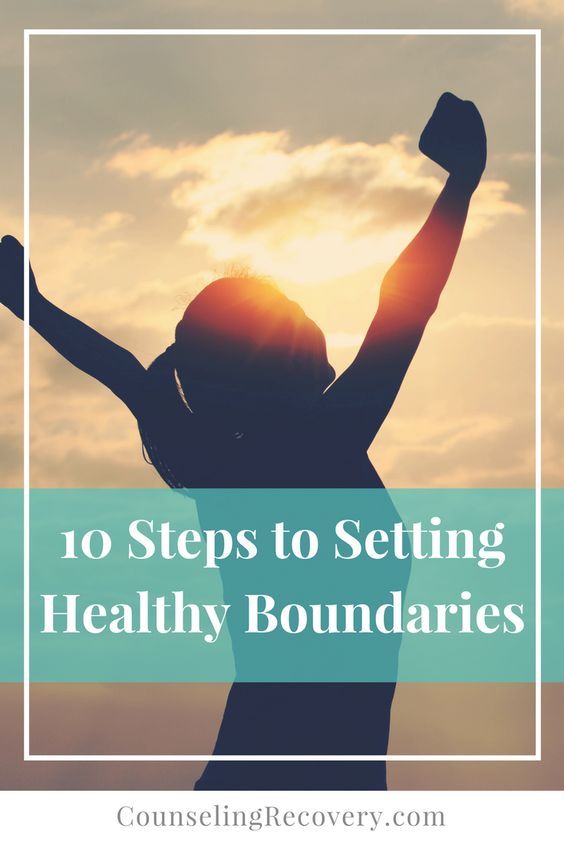10 Steps to Setting Healthy Boundaries
Boundaries are one of the most powerful tools you have in relationships. They make you feel like you matter and that you're safe. Asking for what you want makes relationships mutually satisfying.
When boundaries are a struggle, you feel unsure of yourself. You go along with what others want because it's easier. You don't want to risk a potential conflict.
So you keep quiet. But something needs to change. You are getting tired of not putting your needs out there!
That means setting boundaries.
Here are the steps to take, one at a time in this order. Each skill is necessary to move on to the next. They build off each other.
So let's get started.
What are Boundaries?
Boundaries are limits you set for yourself about what you are willing to participate in. They are not about getting someone else to change. Here are steps to walk you through how to set a boundary. For more read my article What are Healthy Boundaries?
1. Know What You Want
If you have spent years denying what you want, I get it. You're not alone in that struggle! Focus on what you want. Start small to build your confidence. These examples can spark some areas for you.
Example:
What values are important to you?
What is most important to you in relationships?
What bothers you the most in relationships?
What don't you ask for that you secretly want?
Spend some time writing out your answers. Doing this will help you get clarity about what's important to you - and that makes all the difference.
How to set healthy boundaries
2. Give Yourself Permission
The biggest obstacle in asking for what you want is fear. Fear that someone will get mad or be disappointed.
Setting boundaries means feeling the fear and doing it anyway. This gets easier with practice. Start with the safest people until you gain confidence.
3. Be Specific about What You Want
When setting boundaries, be clear and concise. Avoid asking others to change. That's control not a boundary. Your wants should be easy to understand.
Example: I really need help with picking the kids up this week. Are there days that you could do it?
4. Ask without Apology
One of the main reasons people struggle with setting boundaries is guilt. You think that asking for what you want is selfish. Maybe you were taught that growing up.
Let go of old beliefs that don't serve you is an important part of growth. Act as if you deserve to ask for what you want because you do.
5. Watch Your Expectations
Expectations are premeditated resentments especially when setting boundaries. Asking for what you want doesn't guarantee the outcome. Keep in mind that asking someone to do something they've never done might indicate unrealistic expectations.
6. Accept the No
You will not always get what you want. Know that the "win" is in the asking not in the receiving. You are showing the other person respect in a powerful way. By accepting their no.
7. Don't Take It Personally
Once in awhile, you might get a bad reaction. Their reaction is more about them than it is about you. The only piece that belongs to you is how you communicate to others. If you have trouble containing your anger - get my free email course below.
8. Take Responsibility for Your Needs
Realize that it is your responsibility to take care of yourself. Always have alternative plans so that your needs aren't always dependent on others. Your needs are your responsibility. Expecting someone else to do it sets you up for disappointment.
9. Give it to Yourself
If you ask your partner for support and they aren't available, do you have others to call? If not, why not?
Make sure you have several options to get your needs met. Doing this empowers you and makes your primary relationship stronger. That way you avoid developing an unhealthy dependency on one person.
10. Let Go of the End Result
The hardest part of setting boundaries is accepting the outcome. Sometimes, you'll get what you want and other times, you won't. That's part of mature, healthy relationships.
The Benefits of Boundaries
Learning to set boundaries is one of the best things you can do for this New Year. Setting boundaries can clarify the health of a relationship.
If they aren't respected, you may want to reconsider the relationship. If someone reacts negatively whenever you make a request, that's important information. Boundaries highlight whether a relationship is reciprocal.
You deserve to have your needs met - and boundaries are the way to get you there fast!
Sign up for my FREE checklist to assess what’s working and what needs fixing!





